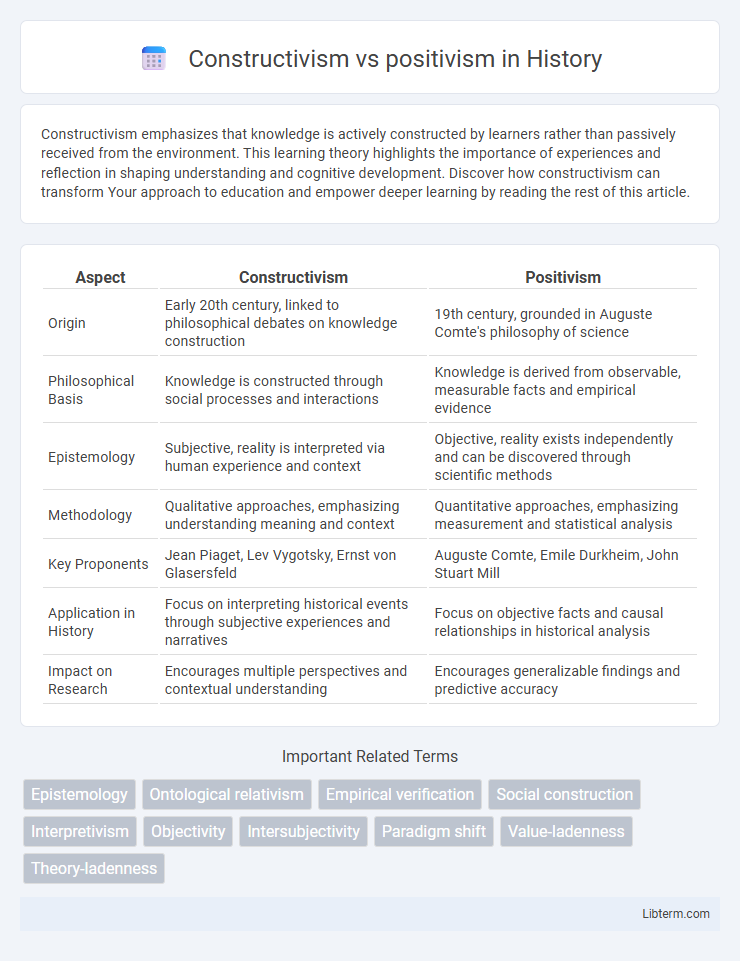Constructivism emphasizes that knowledge is actively constructed by learners rather than passively received from the environment. This learning theory highlights the importance of experiences and reflection in shaping understanding and cognitive development. Discover how constructivism can transform Your approach to education and empower deeper learning by reading the rest of this article.
Table of Comparison
| Aspect | Constructivism | Positivism |
|---|---|---|
| Origin | Early 20th century, linked to philosophical debates on knowledge construction | 19th century, grounded in Auguste Comte's philosophy of science |
| Philosophical Basis | Knowledge is constructed through social processes and interactions | Knowledge is derived from observable, measurable facts and empirical evidence |
| Epistemology | Subjective, reality is interpreted via human experience and context | Objective, reality exists independently and can be discovered through scientific methods |
| Methodology | Qualitative approaches, emphasizing understanding meaning and context | Quantitative approaches, emphasizing measurement and statistical analysis |
| Key Proponents | Jean Piaget, Lev Vygotsky, Ernst von Glasersfeld | Auguste Comte, Emile Durkheim, John Stuart Mill |
| Application in History | Focus on interpreting historical events through subjective experiences and narratives | Focus on objective facts and causal relationships in historical analysis |
| Impact on Research | Encourages multiple perspectives and contextual understanding | Encourages generalizable findings and predictive accuracy |
Understanding Constructivism: Key Principles
Constructivism emphasizes that knowledge is actively constructed by individuals through their experiences and social interactions, highlighting the subjective nature of reality. Key principles include the idea that learning is context-dependent, meaning understanding arises from the learner's engagement within specific environments and cultures. This contrasts with positivism's focus on objective, measurable facts and the belief in a single, observable reality.
Defining Positivism: Core Concepts
Positivism centers on empirical observation and scientific methods to acquire knowledge, emphasizing measurable data and objective reality. It advocates that all authentic knowledge is derived from sensory experience and can be verified through experimentation and logical analysis. Core concepts include the reliance on observable phenomena, the law-like generalizations, and the rejection of metaphysical speculation.
Historical Origins of Constructivism and Positivism
Constructivism emerged in the early 20th century, influenced by philosophers like Immanuel Kant and sociologists such as Max Weber, emphasizing subjective interpretation and social context in knowledge creation. Positivism originated in the 19th century with Auguste Comte, promoting empirical observation and scientific methods as the foundation of valid knowledge. These contrasting historical roots illustrate constructivism's focus on meaning construction versus positivism's reliance on observable, measurable facts.
Methodological Differences in Research
Constructivism emphasizes qualitative methods that explore subjective experiences and social realities through interviews, observations, and thematic analysis, prioritizing depth and context. Positivism relies on quantitative techniques such as experiments, surveys, and statistical analysis to test hypotheses and establish objective, generalizable laws. These methodological differences reflect constructivism's focus on meaning-making processes versus positivism's pursuit of measurable and replicable data.
Epistemological Foundations: Knowledge and Reality
Constructivism posits that knowledge is socially constructed, emphasizing subjective experiences and the interpretive nature of reality, where understanding emerges through interaction and context. Positivism asserts that knowledge is objective and verifiable through empirical observation and scientific methods, treating reality as independent and measurable. These epistemological foundations define constructivism as interpretivist and context-dependent, while positivism aligns with empiricism and universal truths.
Advantages of Constructivist Approaches
Constructivist approaches emphasize the importance of context and subjective experiences, enabling researchers to capture the complexity of social phenomena more effectively than positivist methods. These approaches promote deeper understanding through rich, qualitative data by focusing on participants' perspectives and interpretations. Constructivism also allows for flexibility in research design, accommodating evolving insights and multiple realities within the study.
Strengths of Positivist Methods
Positivist methods offer strong empirical rigor by relying on observable, measurable data to generate reliable and replicable results. This approach facilitates hypothesis testing and statistical analysis, enabling clear cause-and-effect relationships to be identified with high precision. Positivism's structured methodology supports generalizability across diverse populations, making it invaluable in natural sciences and quantitative social research.
Limitations and Criticisms of Each Paradigm
Constructivism faces criticism for its potential relativism, where knowledge is seen as subjective and context-dependent, potentially undermining the pursuit of generalizable truth. Positivism is limited by its strict reliance on observable, empirical data, often disregarding the complexity of human experience and social phenomena that cannot be easily quantified. Both paradigms struggle with addressing the full spectrum of reality, as constructivism may overlook objective facts, while positivism can ignore the interpretive and meaning-making aspects intrinsic to human behavior.
Constructivism vs Positivism in Social Sciences
Constructivism in social sciences emphasizes the subjective construction of reality through individual and collective experiences, highlighting the importance of context and meaning in understanding social phenomena. Positivism relies on observable, measurable facts and seeks to identify universal laws through empirical data and scientific methods. The contrast lies in constructivism's focus on interpretive understanding versus positivism's pursuit of objective, quantifiable knowledge.
Choosing the Right Paradigm: Practical Implications
Selecting between constructivism and positivism profoundly influences research design, epistemology, and data interpretation. Constructivism emphasizes subjective reality and context, ideal for exploring meanings and social phenomena, whereas positivism relies on objective measurement and hypothesis testing, suited for quantifiable data and causal relationships. Pragmatic consideration of research goals, questions, and available resources determines the paradigm that best aligns with a study's practical implications and desired outcomes.
Constructivism Infographic

 libterm.com
libterm.com